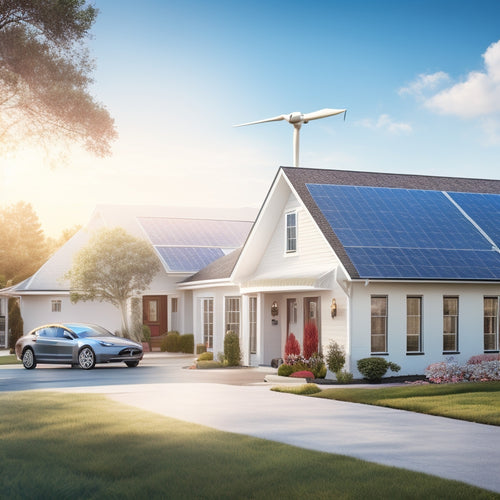
Does Boosting PV Panel Efficiency Enhance Energy Output
Share
You're likely wondering if enhancing PV panel efficiency really makes a difference in energy output. The answer is yes - even small efficiency gains can greatly impact the amount of usable electricity generated from sunlight. By optimizing panel materials, energy conversion rates, and sunlight absorption, you can improve your system's performance metrics, including capacity, reliability, and energy conversion. As you investigate ways to maximize your energy output, you'll find that installation techniques, thermal management systems, and advanced materials can all play an essential role. Now, take a closer look at the innovations and case studies that are driving the future of solar energy production.
Key Takeaways
- Boosting PV panel efficiency directly enhances energy output by increasing the amount of usable electricity generated from sunlight.
- Advanced materials, such as bifacial panels, can increase energy output by up to 25% and improve overall efficiency.
- Thermal management systems and tracking systems can optimize panel performance, leading to significant increases in energy output.
- Real-time performance monitoring and rectification of issues can further enhance energy output by ensuring optimal panel operation.
- Case studies have consistently shown that boosting PV panel efficiency leads to significant increases in energy output, validating theoretical enhancements.
Understanding PV Panel Efficiency
Your photovoltaic (PV) panel's efficiency is a critical metric that determines how much electricity it can generate from the sun's energy. It's a measure of how well your panel converts sunlight into usable electricity. The efficiency of your PV panel depends on various factors, including the type of panel materials used, energy conversion rates, and sunlight absorption capabilities.
When evaluating your panel's performance, you should consider key metrics such as maximum power output, open-circuit voltage, and short-circuit current. These metrics help you understand how your panel responds to environmental factors like temperature, humidity, and irradiance.
Additionally, installation techniques, such as tilt and orientation, can greatly impact your panel's performance. Staying up-to-date with the latest market trends in solar technology can also help you optimize your panel's efficiency.
Advances in panel materials, for instance, have led to more efficient energy conversion rates. By understanding these factors, you can make informed decisions to maximize your PV panel's energy output and get the most out of your solar investment.
Impact on Energy Output Analysis
As you strive to maximize your PV panel's energy output, analyzing its impact on energy output becomes an important step. You need to understand how efficiency enhancements affect your panel's performance metrics, such as capacity, reliability, and overall energy conversion.
Environmental factors like temperature, humidity, and irradiance also play a notable role in energy output. By analyzing these factors, you can identify areas for improvement and optimize your panel's performance.
Technological innovations, such as bifacial panels and half-cut cells, have greatly improved energy output in recent years. Market trends also suggest that the demand for high-efficiency panels is on the rise, driving manufacturers to invest in research and development.
However, the cost implications of these advancements must be carefully considered. As you weigh the benefits of enhancing your PV panel's efficiency, it's vital to examine the cost-benefit analysis and ascertain that the returns justify the investment.
Efficiency Boosting Methods Explained
The silicon wafers that make up a photovoltaic panel are only about 15-20% efficient, leaving ample room for improvement. You can greatly enhance energy output by adopting various efficiency-boosting methods.
-
Thermal Management: High temperatures can reduce PV panel efficiency. Implementing thermal management systems, such as heat sinks or coolants, helps maintain ideal operating temperatures, thereby increasing energy output.
-
Advanced Materials: Researchers are developing new materials with higher energy conversion rates. For instance, bifacial panels can absorb light from both the front and back sides, increasing energy output by up to 25%.
-
Tracking Systems: Traditional fixed-tilt systems can be replaced with tracking systems that adjust the panel's angle to maximize energy absorption throughout the day, resulting in up to 45% more energy output.
- Performance Monitoring: Real-time monitoring of PV panel performance helps identify and rectify issues promptly, ensuring maximum energy output. This includes monitoring temperature, voltage, and current to detect potential faults.
Real-World Case Study Examples
While exploring innovative efficiency-enhancing methods is essential, it's equally important to examine how these strategies play out in real-world scenarios.
You'll find that real-world case studies provide significant revelations into the effectiveness of various efficiency-enhancing methods in solar technology. For instance, a study on a large-scale solar farm in California demonstrated that implementing bifacial PV panels increased energy output by 10%. This increase in efficiency was attributed to the panels' ability to utilize energy from both the front and back sides.
Another case study in Japan showcased the benefits of using tracking systems, which optimized panel angles to maximize energy production. The results showed a substantial 15% rise in energy output compared to fixed-tilt systems.
Future of Solar Energy Production
Moving forward within the realm of solar energy, you're likely wondering what the future holds for this rapidly developing field. As the world shifts towards renewable energy sources, solar technology is set to play a significant role in meeting our growing energy demands.
In the years to come, you can expect significant advancements in solar technology, leading to increased adoption and reduced costs. Here are a few trends that will shape the future of solar energy production:
-
Bifacial Solar Cells: These advanced cells can capture energy from both the front and back sides of the panel, increasing energy output by up to 25%.
-
Perovskite Solar Cells: This emerging technology has the potential to surpass traditional silicon-based cells regarding efficiency and cost-effectiveness.
-
Solar Power Storage: Advancements in energy storage systems will enable households and businesses to store excess energy generated during the day for use during the night or on cloudy days.
- Grid-Parity: As the cost of solar energy approaches grid parity, renewable investments will become increasingly attractive, driving growth in the solar industry.
As solar technology continues to evolve, you can expect to see widespread adoption and a significant shift towards a more sustainable energy future.
Frequently Asked Questions
How Does Temperature Affect the Efficiency of PV Panels?
You're likely aware that a 1°C temperature increase can reduce PV panel efficiency by 0.45%. Now, let's explore the temperature effects: high temps impair performance, making effective thermal management essential to maintain ideal energy output and maximize your power generation.
Can Mirrors or Concentrators Increase PV Panel Efficiency?
You're exploring ways to optimize PV panel performance, and now you're considering if mirrors or concentrators can increase efficiency. By implementing mirror technology or concentrator systems, you'll enhance sunlight, potentially raising energy output, but it's essential to weigh gains against added complexity and costs.
Are More Efficient PV Panels Worth the Added Cost?
You're likely thinking, "Won't more efficient PV panels break the bank?" However, you'll find that a thorough cost-benefit analysis reveals they're a worthwhile long-term investment, as increased energy output and reduced maintenance costs ultimately offset the added upfront expense.
Do Solar Panel Inverters Affect PV Panel Efficiency?
You're wondering if solar panel inverters impact PV panel efficiency. The answer lies in inverter technology, which affects energy conversion. A high-quality inverter optimizes DC power conversion to AC, minimizing losses and enhancing overall system efficiency, so yes, it matters.
Can PV Panel Efficiency Be Improved With Cleaning?
You can greatly improve PV panel efficiency by prioritizing panel maintenance, as dust accumulation reduces energy output; regular cleaning eliminates this obstruction, allowing your panels to utilize maximum sunlight and generate more power.
Related Posts
-

Why You Need a Phone Mount for Navigation
When you're on the road, a reliable phone mount is not just a convenience, it's a safety necessity that helps you mai...
-

Why Certification Matters for Residential Panels
You're looking to understand why certification matters for residential panels. Basically, third-party certification g...
-

Why Homeowners Are Embracing DIY Energy Independence
By taking control of your energy needs, you're breaking free from the uncertainty of utility bills and embracing a se...


